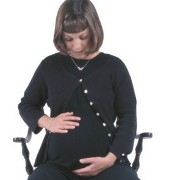 Photo: Getty Images
Photo: Getty Images
Whether or not a woman can get pregnant while on her period has been a debate topic for decades. On one side, the chances of becoming pregnant during a period are slim, but possible. On the other, is it a true period or something else?
There are generalities about the basics of menstruation and pregnancy, but every woman’s hormonal balances and menstrual cycles are different.
Women ovulate. Then the egg moves through the fallopian tubes to the uterus. If sperm is present, given the right conditions, fertilization takes place. An unfertilized egg may live for 24 hours and if it’s not fertilized during this time, it and the uterine lining are shed during the next menstrual period.
Ovulation typically takes place, on average, about 14 days before the start of a woman’s monthly period. Even for women with regular periods, this timing or duration can vary month to month. A woman's cycle can be altered due to stress, hormone or weight changes. Many women have cycles which last as little as 22 days or as long as 35 days.
Since women have very different cycles, many experience bleeding that’s not actually a period between their cycles. Stress, illness and many other things can cause bleeding that is easy to mistake for a period. If it’s not actually your time of the month, you could get pregnant.
Women who are not menstruating because of low body weight, breastfeeding, perimenopause or illness or medications may experience ovulation at any point. If they’re ovulating, they can become pregnant.
Besides misleading vaginal bleeding, the life term of sperm is another reason why it’s possible for women to get pregnant during their periods.
Sperm can survive for an average of three to five days inside a woman’s body. If sperm are deposited early, during a woman’s period, they could wait around a few days until conditions are right for conception. A woman is most likely to become pregnant if sexual intercourse occurs just before or just after ovulation. The egg itself, however, can only live for about a day once released. If a woman ovulates soon after her period, then conception could take place from intercourse that occurred during her period.
Most likely the debate about women getting pregnant during a period will only continue. Every woman is different and it seems there will always be a case for both sides of the argument.
Sources:
Suite101.com
Mayo Clinic
Americanpregnancy.org
Planned Parenthood




Add a Comment2 Comments
This tips are really amazing! I was searching for tips about sex on period generally and I found this amazing site with lots of useful tips covering things from „how to avoid making a mess“ to „can you get pregnant on your period“. You should check it out, it can definitely help you - http://www.sexonperiod.com/
August 5, 2011 - 8:14amThis Comment
There is no argument, this is basic biology;
A woman cannot get pregnant during her period, but she can get pregnant as a result of sex during her period.
During menstruation there is no egg to fertilise - no egg, no baby. Furthermore the uterus lining is breaking down so could not support implantation by a fertilised egg even if there was an egg present. Yes a woman may bleed for a number of reasons, but that doesn't change the fact that when a woman is menstruating she cannot get pregnant during that time...
If a woman has a particularly short cycle then during her period she may have fertile quality cervical mucus present - this keeps sperm alive within the vagina up to 7 days, so if a woman ovulates soon after menstruation then she may fall pregnant then as a result of sex on her period - AFTER menstruation, not during.
Please don't perpetuate myths.
February 10, 2011 - 6:52amThis Comment